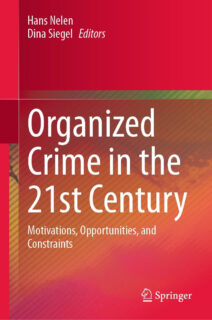“Clan Crime” in Germany – a book chapter by Mahmoud Jaraba
The book Organized Crime in the 21st Century, recently published by Springer, provides the most recent information about various organized crimes. It focuses on the impact of networking and illegal markets.
In Germany, an intense political and media discussion has emerged on the phenomenon of “clan crime” (Clan-Kriminalität). In the course of the debate, “Arab clans” have often been accused of establishing criminal networks based on kinship and family ties. Despite the public debate, however, there has been very little empirical research on the topic and virtually no attempt to understand it on a scientific basis by examining its socio-historical and cultural contexts.
In his book chapter, Dr Mahmoud Jaraba demonstrates the roles of migration politics, socio-economic conditions, and kinship dynamics in shaping the structure and character of “clan crimes” in Germany. He argues that when a crime is committed by a member of a clan, it usually takes place either within that person’s nuclear family or independently of it and not at a clan level. Despite a widespread belief to the contrary, in my fieldwork, I found no evidence of clans either organizing or supporting organized criminal activity.
